The Importance of Retreat
Sermon from UUCGT's Service on Sun., May 18, 2025. Preached by the Rev. Alex Jensen, Senior Minister at the Unitarian Universalist Congregation of Grand Traverse (UUCGT), Traverse City, Michigan.
Why consider retreat experiences? How is this type of space helpful for our personal and spiritual lives? For our inner creativity? Rev. Alex reflects on his times on retreat and the unique ways we Unitarian Universalists have a spiritual "passport" to respectfully encounter and learn from other traditions along the way.
Last year, I embarked on my first-ever silent retreat with a bunch of monks! Arriving at the Society of Saint John the Evangelist[1], a Monastery of the Episcopal Church just a stone’s throw from Harvard Yard, I began my three-day self-guided retreat; a time I spent in total silence. My room was a simple cell, like you can see pictured, with a window, bed, desk, and prayer bench. Alongside the twelve monk brothers and a handful of other outside guests, we went about our days and ate our meals in silence. The only form of communal engagement centered around their four times of prayer throughout the day.
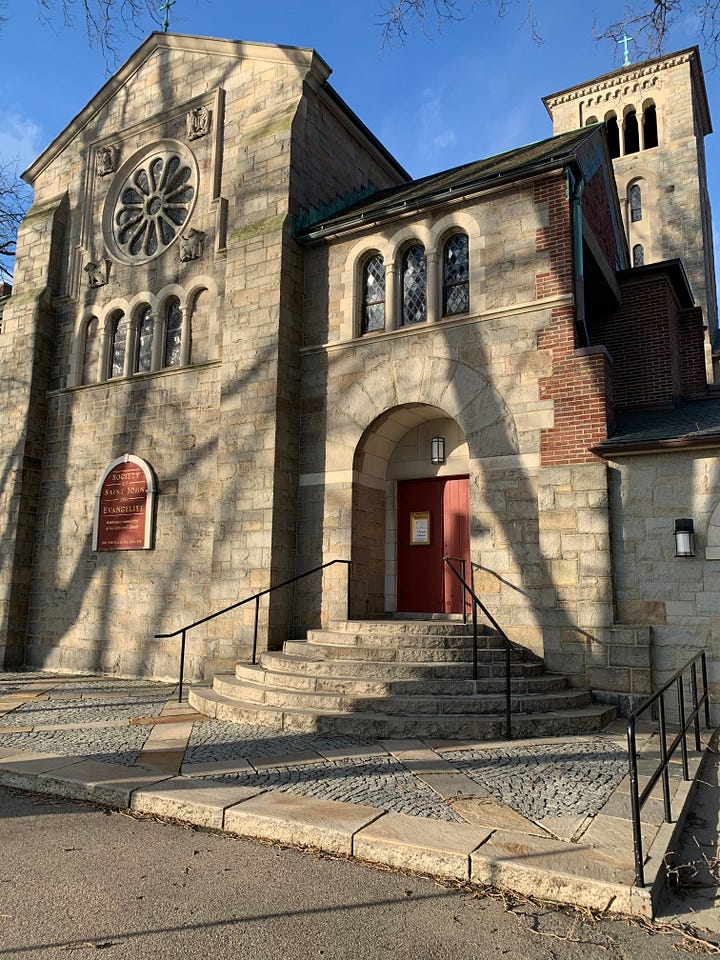
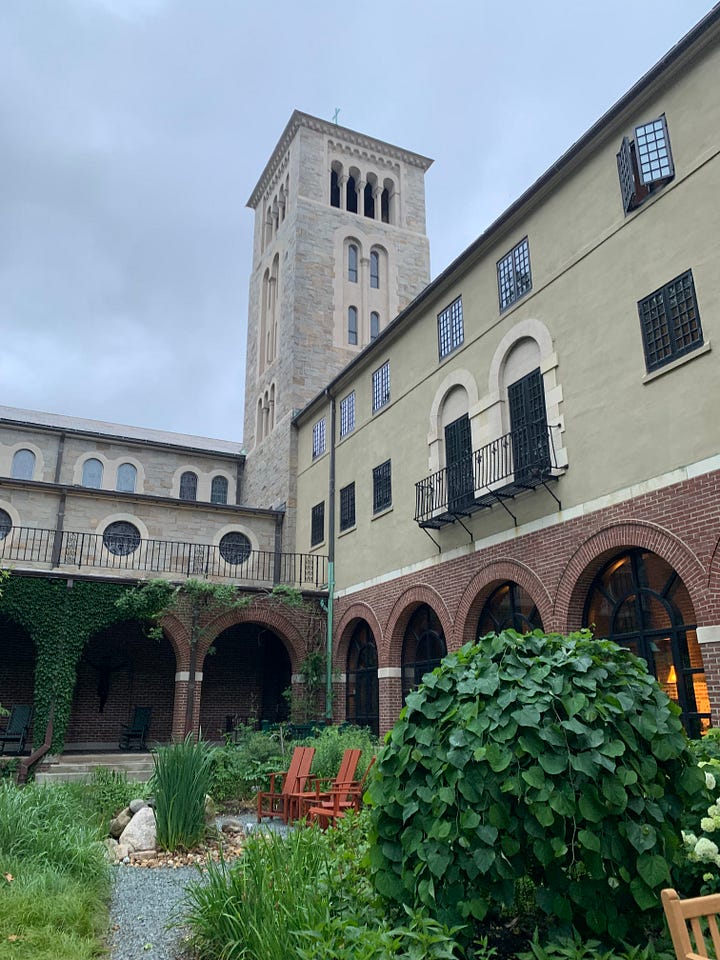
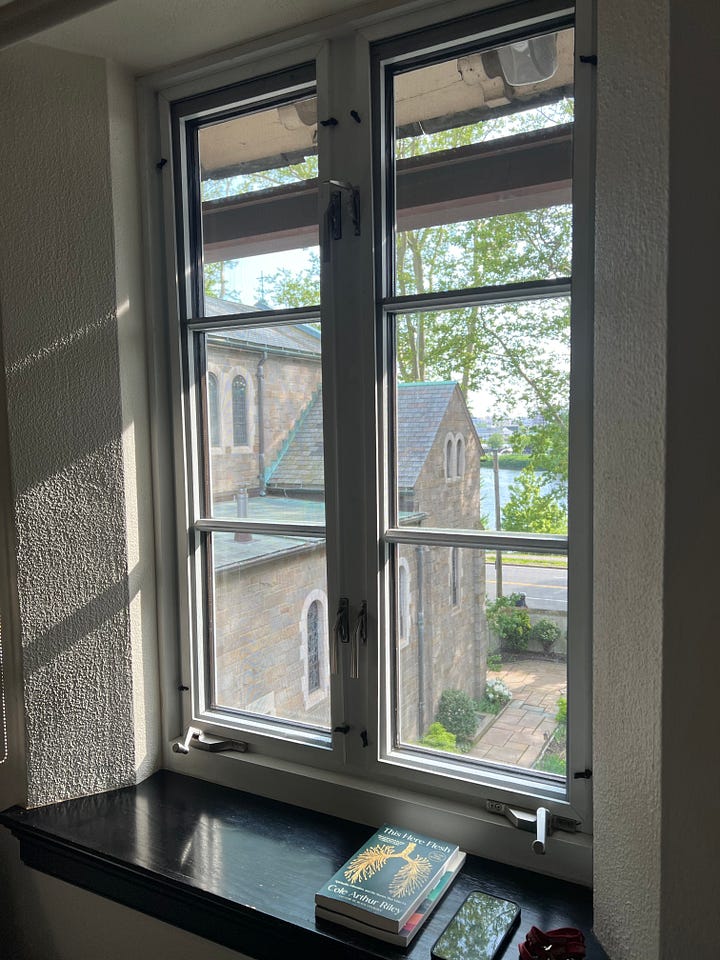
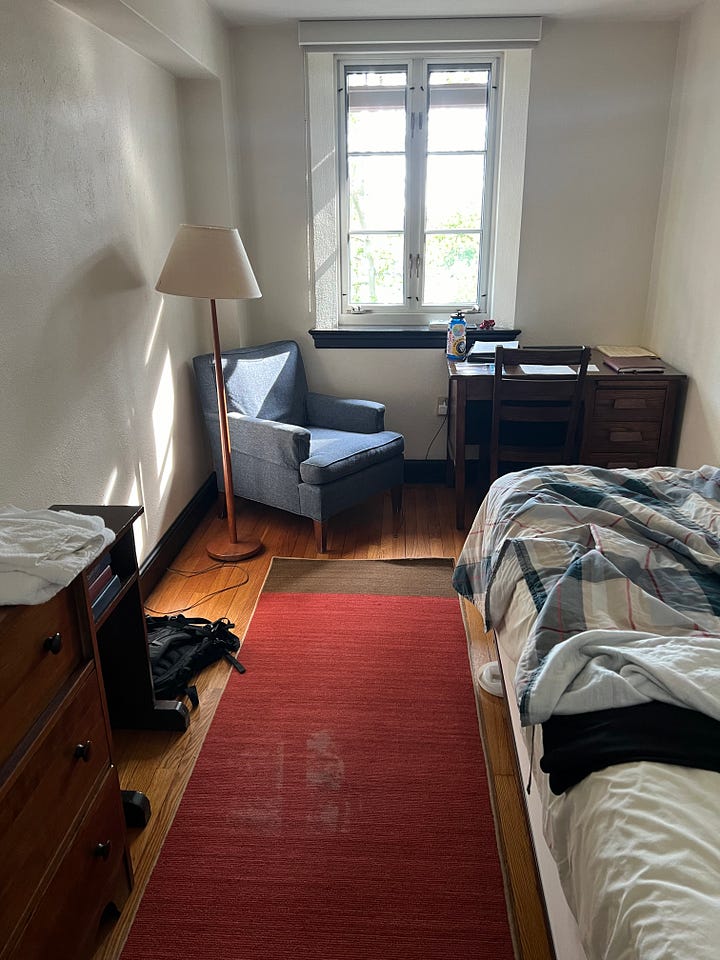
Being a Unitarian Universalist, this felt like a rich opportunity to use my “spiritual passport” in being a guest to this whole other tradition, rhythm, and way of life. Though, I admit, I felt a lot of trepidation. What would I do with myself with all of this unstructured time?! Wouldn’t I get bored? Would I lose it, after so much quiet?
Funny enough, life becomes fairly simple when your whole day revolves around silence, meditation, and prayer! I was so good at the monastic life that one of the brothers even came up to me at one of their prayer services and asked if I had ever considered becoming a monk! I confessed that I was a UU minister; that I had just a few commitments in my life that would make that a challenge, like my upcoming marriage to my husband last August. The brother clearly had a sense of humor. He smiled, leaned over, and quipped: “Stranger things have happened!” Needless to say, at least I’ve got some options if this whole UU ministry thing doesn’t work out!
Today, we’re exploring the spiritual practice of retreat: that intentional practice of holding space for stillness and silence in our lives. Something that might even feel hard to come by in our daily lives. Now, in talking about “retreats” we’re talking about something a bit different from the retreats you might have for work or even here at church. Retreats, in those cases, might as well be synonymous with a productive, all-day work party!
Just to gauge the room, how many of you, like me, have ever done a silent retreat at least once in your life? How many of you are feeling like that would be too hard or too out of reach for you, to spend that much time in silence? It’s okay to be honest! Well, don’t worry if this is something you haven’t yet tried or are even feeling nervous about trying. My goal today is to encourage you to spend more time in silence in your life. To make regular time for experiencing that quiet and hidden world: the world unheard.
Many of us find the practice of retreating hard for a variety of reasons. First and foremost, our world is not conducive to retreating. The noise and hustle and bustle of daily life is everywhere. Tell that to any person who lives off a major roadway, like me! We have a habit of filling our lives to the brim, with each and every waking moment occupied by a particular task, job, or responsibility.
The noise of the world isn’t just external. It’s also found within our homes. Those of you that have ever tried even just retreating at home know the challenge of carving out time for sacred stillness. How easy it is for us to become distracted, to fill silence with noise and chatter. How those we love and those we live with also fill our homes with activity and sound. It becomes increasingly hard to set aside time and space for retreat when you’re at home, with your already ingrained rhythms and routines.
Not to mention, for many of us, silence itself might feel uncomfortable. How many of us know or live with someone who craves noise? Someone who has the TV or radio on all the time and doesn’t like when there isn’t something to fill the silence? You introverts are out there saying: “Tell me about it!”
Many of us are uncomfortable with silence or have learned to associate silence with loneliness or abandonment. This might even be a trauma response for us. It takes time to get comfortable with silence and stillness. To push past our desires to fill the silence with sound and to allow silence to speak for itself. That’s where silent retreats are not just a spiritual practice but a spiritual discipline. It takes a lot of intentional energy at times to get comfortable with silence.
Silent retreats are all about holding space for stillness. The absence of everyday sounds and chatter allows us to hear the world in a different way; to experience a hidden world lying in plain sight. The absence of this noise doesn’t just allow us to tune into this hidden world. It helps us to notice sounds and sensations we otherwise might not stop to hear: The rustling of wind on leaves. The gentle dribble of a creek. The chatter of birds in between the roar of cars. Even the sounds of our own beating hearts.
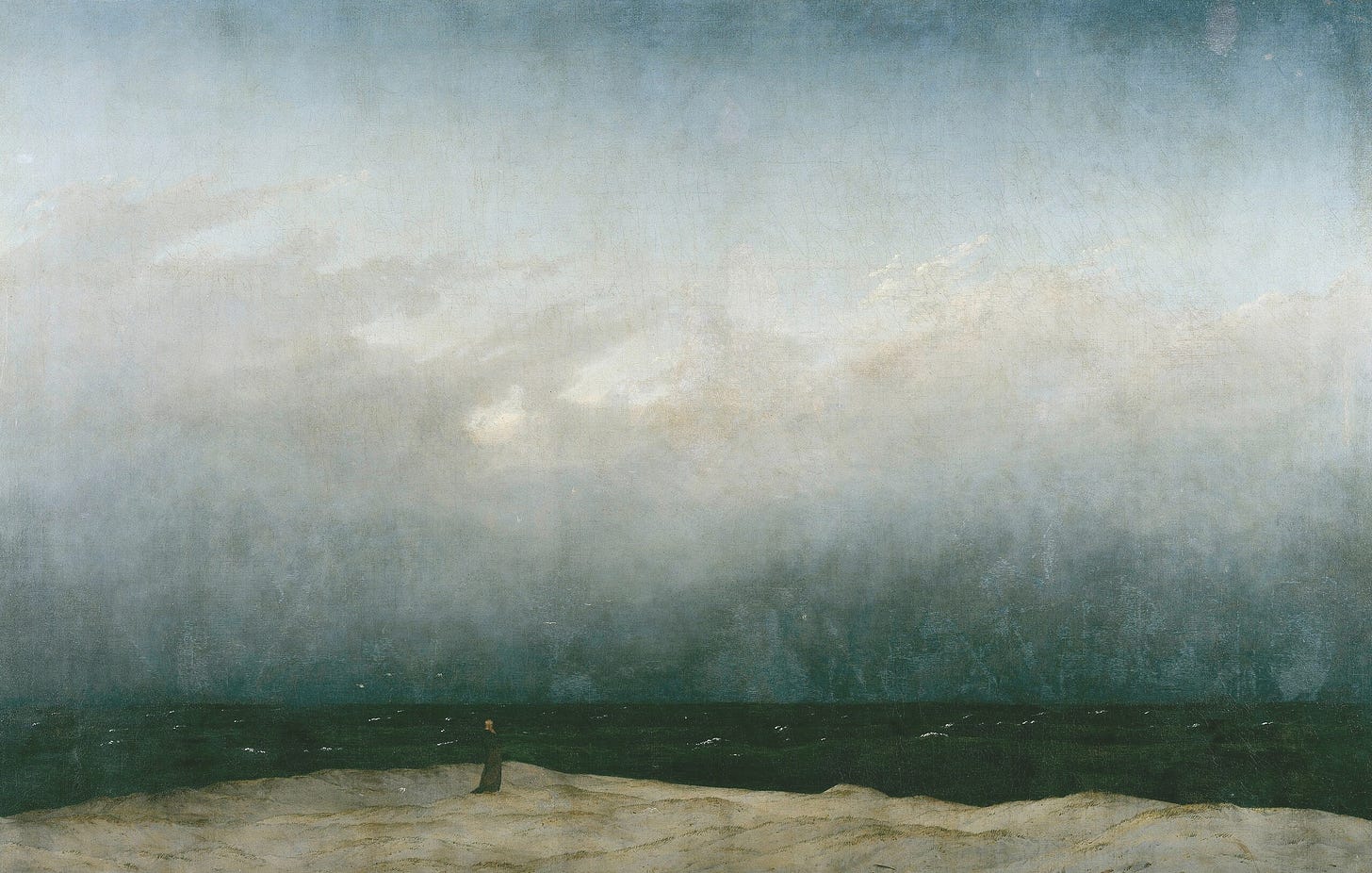
Core to our Soul Matters programming here at UUCGT, there’s a teaching from the Quaker educator and activist Parker Palmer, when speaking about the specialness of silence in small groups as a way of listening to one another and ourselves. Palmer says: “The soul is like a wild animal… If we want to see a wild animal, the last thing we should do is go crashing through the woods, shouting for [it] to come out”.[2] However, if we are willing to walk gently and to be still, to even sit silently for an hour or two, the animal we’re waiting for may well emerge… We might even catch a glimpse of the wildness we so desperately seek.
Silent retreats are all about getting quiet and still and allowing the shy soul to emerge. To allow that still small voice within each of us to speak, in a world where that still small voice isn’t always given the room to emerge. Retreating is about allowing ourselves to experience wildness; to allow the wild itself to envelop us. That’s what’s so special and necessary about making time in our lives to get quiet and still.

Tricia Hersey, well-known to many as the “Nap Bishop,” and author of Rest Is Resistance, a book we heard from a few Sundays ago… Hersey tells us that we need to actually become “escape artists”[3]: to become artists in the art of escape with the demands of capitalism and our routine lives. In her newest book We Will Rest! The Art of Escape, she outlines a few key essentials to retreating and escaping from a noisy world. How to escape from the noise and demands of the world itself is truly an art; something that takes practice.
In her view, it starts first in your own belief in your power to refuse. How without this starting point, we won’t allow ourselves the permission to go away or retreat. We must believe in our own individual power to refuse and to step away from our full and busy lives. Alongside this, we need strong boundaries around our retreats and our escapes so that they can be what we need. Boundaries that hold fast and shut things out that would distract us or pull us away from our escape.
Likewise, we must learn the art of improv: of improvising escape and rest in each moment. To find time in our daily lives to slow down, to listen to our bodies, and to bear witness to our silent, inner worlds. These are all key tools for a retreat, like a painter might use different brushes on a canvas. Retreating is an art. The art of escape takes tools and practice.
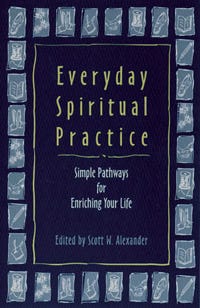
Right before I set out for my silent retreat last year, I felt a lot like Andrew Kennedy did in our Reading[4], especially with how people reacted when I told them I was going to do this. Some were surprised, even a bit skeptical, asking that same question: Why would you even want to do that?! Do you know what you’re getting yourself into?
In the midst of wrapping up the congregational year and needing to prepare for the summer and the year ahead, I found that I actually needed this space for retreat. Now, having time each year for a retreat in silence is an annual rhythm I’ve come to expect. But it’s also a rhythm I’ve come to need. In fact, this next week, I’m actually about to go on retreat yet again for a few days in the woods, at a cabin retreat center.
Participating in the spiritual practice of retreat allows me the space I need for reflection and quiet to think about the past year and envision what’s next. Without this intentional space for quiet and rest, I wouldn’t be able to do the spiritual homework that planning an entire year of Sunday services demands: to notice what stirs in my soul; what feels alive and meaningful for me to preach about. This is now especially true as my own preaching has become more and more the sermon or message that I need to hear on any given Sunday that I allow others to listen in on as well. You clergy and former preachers in the audience know this as well.
This reminds me of that teaching from our Reading, of the rabbi who prays for an hour every morning who is asked: What happens to your spiritual practices when you’re really busy? Do you cut any of it short? To which the rabbi says: Oh, no, I go for an hour longer! Sometimes, when we are the busiest, when our lives are full of tasks and demands, we need to return to the wild. To return to what is elemental: silence and stillness. That which we cannot see, taste, smell, or touch. That which we can only hear by its absence.
So, hopefully I’ve convinced every one of you by now to give silence and stillness a try… I’m a pretty good negotiator, I know! So, where do you even start? How do you find an entryway into this hidden world; into this world of escape and retreat?
First, you’ll need to start small, with a retreat even just for a day or two: enough time to sink into the stillness but not too much time where you’ll feel discouraged. Before embarking on your first silent retreat, make a plan for how you’ll spend your time, even just a general list of reflective activities or things you can do on retreat. Having hours and hours of empty time can feel overwhelming, so it’s important to make the time intentional; to know how you intend to use your time.
Next, you’ll want to bring things that help you to center yourself and that bring out your quiet, reflective side… A good journal. Some meaningful books to read. Some art materials, crafts, and paints. Comfy pajamas. Your favorite meditation cushion! Leave behind the things that might distract you and pull you out of retreat. Switch your phone to “airplane mode”. Leave your digital life behind for a couple of days. Set a hard and fast boundary around not bringing work with you while you’re trying to escape.
I also recommend finding retreat centers that make planning and accommodations easy; that even offer their own guidance on how to do retreats well. You might even consider finding communities of practice, like temples or monasteries, that welcome guests to retreat and practice alongside them. There’s such a richness to experiencing other traditions and allowing ourselves feel what is called “holy envy”: being open to aspects from other faiths that you admire so deeply that you wish they were a part of your own.[5]
Above all, learn to recognize and experience what it feels like when your soul is allowed to emerge. Once you have a feel for this, for when the silence is no longer a burden but a resource… When you feel time start to expand as a space in and of itself… Then you’ll know you’re retreating right.
To close, I invite each of you to experience stillness. Stillness and silence are your birthright. It is only in the stillness that the small, wild, and quiet part of yourself is given the space to emerge. May you not be too busy or too burdened to experience silence. May you not be afraid to refuse a world and a lifestyle that’s hell-bent on working you to the bone. May you take heart in the unheard world that’s waiting to emerge and to show you parts of yourself that are still yet to be discovered. May we all make time to return to ourselves, knowing that the self is our greatest gift of all.
Amen.
[1] “The Society of Saint John the Evangelist (SSJE)”.
[2] A Hidden Wholeness: The Journey Toward an Undivided Life by Parker J. Palmer. (Quote)
[3] We Will Rest! The Art of Escape by Tricia Hersey.
[4] “Silent Retreats”, a reflection by Andrew Kennedy, from Everyday Spiritual Practice: Simple Pathways for Enriching Your Life ed. Scott W. Alexander.
[5] “Holy Envy: What We Learn By Studying Other Faiths” by David Dollahite.

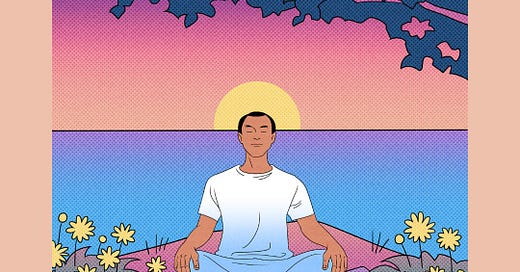



A very thoughtful sermon, Rev! I began a daily meditation practice about 15 years ago. As a creature of habit, each morning I read the newspaper, clear e-mails and messages. After an hour or so of disappointment at the state of the world, I find if I spend 15 - 30 minutes in silent meditation I can get centered again in the moment. It's kind of like a mental decompression valve for me.
Peace, my friend,
Bobbie